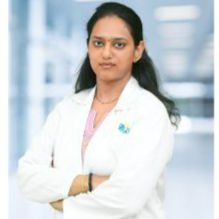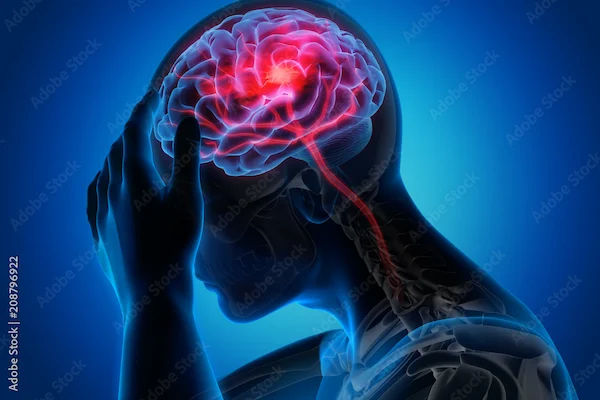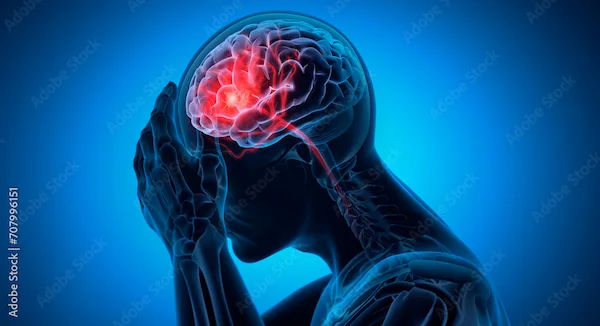Understanding Brain Stroke Meaning
Gain a clear understanding of brain stroke, its meaning, and how it impacts the body. Learn about the different types (ischemic, hemorrhagic), common symptoms, and why immediate medical attention is crucial for effective treatment and recovery.

Written by Dr. Shaik Abdul Kalam
Reviewed by Dr. Dhankecha Mayank Dineshbhai MBBS
Last updated on 12th Aug, 2025

A brain stroke is a serious medical emergency that occurs when the blood supply to part of the brain is interrupted or reduced, depriving brain tissue of oxygen and nutrients. Within minutes, brain cells begin to die, which can lead to long-term disability or even death if not treated promptly. Understanding the meaning, causes, symptoms, and prevention of a brain stroke can help you take quick action and reduce risks.
What is a Brain Stroke?
A brain stroke happens when there is a sudden disruption in blood flow to the brain. This can occur in two main ways:
1. Ischemic Stroke – The most common type (about 87% of cases), caused by a blood clot blocking an artery supplying blood to the brain.
2. Hemorrhagic Stroke – Occurs when a weakened blood vessel ruptures, causing bleeding in or around the brain.
A third, less common type is a Transient Ischemic Attack (TIA), often called a "ministroke," where blood flow is temporarily blocked. While TIAs don’t cause permanent damage, they are warning signs of a possible major stroke.
Signs and Symptoms of a Brain Stroke
Recognizing stroke symptoms early is crucial for quick treatment. Remember the acronym FAST:
- Face drooping – Does one side of the face droop when smiling?
- Arm weakness – Can the person raise both arms equally?
- Speech difficulty – Is speech slurred or hard to understand?
- Time to call an emergency – If any of these signs appear, seek help immediately.
Other symptoms may include:
- Sudden numbness in the face, arm, or leg (especially on one side)
- Confusion, trouble speaking, or understanding speech
- Sudden severe headache with no known cause
- Trouble seeing in one or both eyes
- Dizziness, loss of balance, or difficulty walking
What Causes a Brain Stroke?
Several factors increase the risk of stroke:
Medical Conditions
- High blood pressure (Hypertension) – The leading cause of strokes.
- Diabetes – High blood sugar damages blood vessels over time.
- High cholesterol – Leads to plaque buildup in arteries.
- Heart disease – Conditions like atrial fibrillation increase clot risk.
Lifestyle Factors
- Smoking – Damages blood vessels and raises stroke risk.
- Obesity & lack of exercise – Contributes to high blood pressure and diabetes.
- Unhealthy diet – High in salt, fats, and processed foods.
- Excessive alcohol – Can raise blood pressure and trigger bleeding strokes.
Age & Family History
- Risk increases after age 55.
- Family history of strokes or heart disease may raise your risk.
How Does a Stroke Affect Health?
A stroke can have severe consequences depending on which part of the brain is affected:
- Paralysis or weakness – Usually on one side of the body.
- Speech & language problems – Difficulty speaking or understanding words.
- Memory & thinking difficulties – Trouble with reasoning or remembering.
- Emotional changes – Depression, anxiety, or mood swings.
- Chronic pain or numbness – Due to nerve damage.
Early treatment can minimize damage and improve recovery chances.
Consult Top Brain Specialists
How to Prevent a Brain Stroke?
Many strokes can be prevented with healthy lifestyle changes:
1. Control Blood Pressure
- Monitor regularly and take prescribed medications.
- Reduce salt intake and manage stress.
2. Manage Diabetes & Cholesterol
- Keep blood sugar levels in check.
- Eat a heart healthy diet (fruits, vegetables, whole grains).
3. Quit Smoking & Limit Alcohol
- Smoking cessation reduces stroke risk significantly.
- Drink alcohol in moderation (1 drink/day for women, 2 for men).
4. Stay Active & Maintain a Healthy Weight
- Exercise at least 30 minutes daily (walking, swimming, yoga).
- Maintain a BMI within the normal range (18.5–24.9).
5. Eat a Balanced Diet
- Include leafy greens, nuts, fish (rich in omega-3), and fiber.
- Avoid processed foods, trans fats, and excessive sugar.
6. Regular Health Checkups
- Screen for heart disease, diabetes, and high cholesterol.
- If you have a history of TIAs, consult a neurologist.
When to Seek Medical Help?
If you or someone shows FAST symptoms, call emergency services immediately. Every minute counts—early treatment can save lives and reduce disability.
For those at high risk, Apollo 24|7 offers expert consultations and diagnostic tests to monitor stroke risk factors. You can book an appointment online for personalized care.
Final Thoughts
A brain stroke is a life threatening condition, but awareness and timely action can make a difference. By adopting a healthy lifestyle, managing chronic conditions, and recognizing early symptoms, you can significantly reduce your risk. Stay informed, stay proactive, and prioritize your brain health.
If you have concerns about stroke risk factors, consult a specialist today and take the first step toward prevention.
Consult Top Brain Specialists
Consult Top Brain Specialists

Dr. Amit Kapoor
Neurosurgeon
18 Years • D.N.B NeuroSurg.
Delhi
Apollo Hospitals Indraprastha, Delhi

Dr. Prabash P R
Neurologist
16 Years • MBBS, MD, DM
Chennai
Apollo Speciality Hospitals Vanagaram, Chennai
(75+ Patients)

Dr. Boby Varkey Maramattom
Neurologist
22 Years • MD, DM (neurology), EDSI, FRCP, FICCN
Angamaly
Apollo Hospitals Karukutty, Angamaly
(25+ Patients)

Dr Sindhu D M
Neurologist
5 Years • MBBS (BMCRI) DM Neurology (NIMHANS ) PDF Epilepsy (NIMHANS)
Bengaluru
Apollo Hospitals Sheshadripuram, Bengaluru

Dr. Gangula Charvitha Reddy
Neurologist
6 Years • MBBS, MD DM NEUROLOGY, SCE NEUROLOGY ( RCP-UK).
Hyderabad
Apollo Hospitals D R D O kanchanbagh, Hyderabad
Consult Top Brain Specialists

Dr. Amit Kapoor
Neurosurgeon
18 Years • D.N.B NeuroSurg.
Delhi
Apollo Hospitals Indraprastha, Delhi

Dr. Prabash P R
Neurologist
16 Years • MBBS, MD, DM
Chennai
Apollo Speciality Hospitals Vanagaram, Chennai
(75+ Patients)

Dr. Boby Varkey Maramattom
Neurologist
22 Years • MD, DM (neurology), EDSI, FRCP, FICCN
Angamaly
Apollo Hospitals Karukutty, Angamaly
(25+ Patients)

Dr Sindhu D M
Neurologist
5 Years • MBBS (BMCRI) DM Neurology (NIMHANS ) PDF Epilepsy (NIMHANS)
Bengaluru
Apollo Hospitals Sheshadripuram, Bengaluru

Dr. Gangula Charvitha Reddy
Neurologist
6 Years • MBBS, MD DM NEUROLOGY, SCE NEUROLOGY ( RCP-UK).
Hyderabad
Apollo Hospitals D R D O kanchanbagh, Hyderabad




